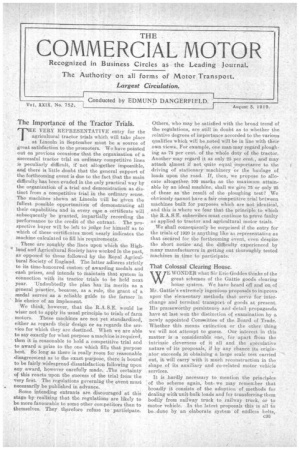The Importance of the Tractor Trials.
Page 1

If you've noticed an error in this article please click here to report it so we can fix it.
THE VERY REPRESENTATIVE entry for the agricultural tractor trials which will take place at Lincoln in September must be a source of great satisfaction to the promoters. We have pointed out on previous occasions that the organization of a successful tractor trial on ordinary competitive lines is peculiarly difficult, if not altogether impossible, and there is little doubt that the general support of the forthcoming event is due to the fact that the main difficulty has been evaded in the only practical way by the organization of a trial and demonstration as distinct from a competitive trial in the ordinary sense. The machines shown at Lincoln will be given the fullest possible opportunitiels of demonstrating all their capabilities and in every case a certificate will subsequently be granted, impartially recording the performance to the credit of the entrant. The prospective buyer will be left to judge for himself as to which of these -certificates most nearly indicates the machine calculated to fill his requirements.
These -are roughly the lines uport which the High • landand Agricultural Society have worked in the past, as opposed to those followed by the Royal Agricultural Society of England. The latter adheres strictly to its time-honoured custom of awarding medals and cash prizes, and intends to -maintain that system in connection -with its tractor trials to -be held next year. 'Undoubtedly the planhas its merits as a general practice, because, as a rule, the grant of a medal serves as a reliable guide to the farmer in his choice of an implement.
We think, however, -that the R.A.S.E. -would be wiser not to apply its usual principle to trials of farm . motors. These machines a-re not yet standardized, either as regards their design or as regards the service for which they are destined. • When we are able to say exactly for what purpose a machine is required, then it is reasonable to hold a competitive trial and -to award a prize to the one -which fills that purpose best. So long as there is really room for reasonable disagreement as to the exact purpose, there is bound to be fairly widespread dissatisfaction following upon any award, however carefully made, The certainty o( this reacts upon the success of the trial fraina the very first. The 'regulations governing the eVeut.must necessarily be published in advance. , • . . Some intending entrants are discouraged at this stage byrealizing that the regulations are likely to be more favourable to some other competitors than to themselves. They therekre refuse to participate. Others, who may be satisfied with the broad trend of the regulations, are still in doubt as to whether the relative degrees of importance accorded to the various qualifies which will be noted will be in line with their own views.. For example, one man-may regard plough ing as 75 per cent. of the whole duty of the tractor. Another may regard it as only 25 per cent., and may attach almost if not quite equal importance to the driving of stationary machinery or the haulage of loads upon the road. If, then, we propose to allocate altogether, 100 marks as the maximum attainable by an ideal machine, shall we give 75 or only 25 of these as the result of the ploughing test? We obviously cannot have a fair competitive trial betvveen machines built for purposes which are not identical, and this is where we fear that the principle to which the R.A.S.-E. subscribes must continue to prove faulty as applied to tractor and agricultural motor trials.
We shall oonseqUentlY be surprised if the entry for the trials of 1920 is anything like as representative as that secured for the forthcoming event, even despite the short notice and the difficulty experienced by many manufacturers in getting out thoroughly tested machines in time to participate.






















